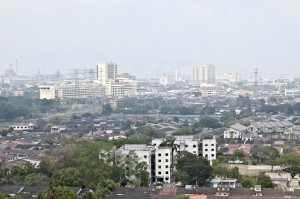 You’ve found your dream home and are already imagining yourself serving dinner in a top-of-the-range kitchen. However, before you start picking your wall colour, consider the possibility of your home loan not being approved.
You’ve found your dream home and are already imagining yourself serving dinner in a top-of-the-range kitchen. However, before you start picking your wall colour, consider the possibility of your home loan not being approved.
Today’s home loan application and approval process can be tedious, with so many possibilities of issues springing up and causing your application to end up in the rejected pile.
Home loan requirements have grown stricter over the years. Hence, as a home loan borrower, you need to be more prepared than ever. Here are some ways that you could be sabotaging your home loan application:
1. You are a bad paymaster
Lenders often use your ability of paying bills on time as a benchmark when it comes to accessing your loan repayment ability. Missing out on your monthly bill settlements will lower your credit score. If your credit score is lower than expected by the lender, your chance of securing a home loan is pretty much slim to none.
Whenever lenders process a loan, they will check for your credit score through the Central Credit Reference Information System (CCRIS). CCRIS, managed by Bank Negara, will reflect your loan repayment record for the last 12 months. The report will cover your credit behavior for the past year listing out every credit product you’ve taken up or applied for such as hire-purchase loans, business loans, personal loans and credit cards.
If your records show that you are an irregular paymaster, the bank looking at your report may give you a low credit score, making the chances of your home loan application being rejected high. Lenders like to see a clean credit record and evidence of maintaining payments to previous lenders and service providers.
If you are planning to get a loan in the future, make sure you spring clean your record by paying your bills vigilantly and promptly. The good thing is, CCRIS only store information of your active credit up to 12 months, hence, you can apply for a loan again a year later after you have cleaned up your CCRIS report.
As a precautionary measure, make sure to obtain your CCRIS report before applying for a home loan. This will tell you where you stand in terms of your own credit score. If your credit score is not appealing, then you really shouldn’t try to apply for a loan, which brings us to the next point.
2. Applying for credit that you are not qualified for
If you think just trying your luck with a loan is a good idea, think again. Not only will your application be rejected, the rejection will negatively impact your credit score, making future credit application tougher.
CCRIS allows lenders to track your loan submissions and rejections to any other lenders. If a bank sees that previously more than one lender has rejected your loan application, they would consider you a risk to give a loan to.
If a lender disapproves your loan application, do not panic. Check your CCRIS and find out why your loan is being rejected, and work on improving that aspect before applying for your next loan. If it is merely a case of the lender being overly stringent in their approval process, do your research properly and apply to a lender that would be able to cater to your financial conditions.
A mortgage broker, like the services offered by iMoney.my, will be able to advise you on the application process. The broker would be able to calculate your affordability based on your debt-service-ratio (DSR) before they even begin the application process. This will minimise the risk of your home loan being rejected.
3. Having more debt and without increasing income
Debt-service-ratio (DSR) is a ratio of your net income and your monthly credit commitment. Credit providers are required to observe prudent debt service ratios in their credit assessments to ensure households have sufficient financial buffers to protect them against rising costs and unexpected adverse events.
This is part of the effort taken by Bank Negara Malaysia (BNM) to lessen the debt burden amongst Malaysians.
The calculation of DSR is done by comparing your total net income (gross income minus EPF contribution and income tax) against your total credit commitments, such as monthly repayments for your hire purchase loan, personal loan, study loan, credit card, or other home loan.
The standard DSR limit adopted by most lenders is between 60% and 70%. If your DSR is higher than the lender’s limit, you could risk having your home loan rejected.
Before applying for a loan, find out what the lender’s debt-to-income ratio requirement is and check if it matches yours. If it does not, look out for other lenders that may have higher limits for the debt-to-income ratio. You can also pay off some of your smaller debts like credit card or study loan to achieve a lower debt-to-income ratio.
4. Unable to provide all the required documents
Credit providers usually require similar set of documents to process your application. The documents required are:
- filled and signed application form from the lender
- the borrower’s NRIC or identity card
- a copy of sales and purchase agreement (SPA) or booking receipt or Letter of Offer from the developer
- a copy of Individual Title Deed
- Property Valuation Report (for completed properties)
- latest 3 consecutive months of salary slips or vouchers
- latest 6 consecutive months of commission statement (if pay is commission-based)
- latest EPF statements (with 3 consecutive months or more transaction history)
- latest EA form
- latest 6 months bank statement for the salary account
- Letter of Confirmation of Employment and Remuneration
For borrowers who are unable to produce the above list of documents, the chances of your loan being approved can be negatively affected.
Even worse, some may be inclined to the idea of creating fake financial documents or engaging a third party or syndicates to get this done to get their home loan approved. This can have worse consequences than getting your home loan rejected.
If the lender finds out that you had forged these documents, not only will your home loan get rejected, you could also end up behind bars for forgery. Lenders have ways to verify if each and every document you present is genuine or fake. For example, if you forge your pay slip, the lender can cross-check your pay with your EPF statement.
5. Unable to prove the stability of your income
Most often than not, home loan applications get rejected for this reason – having income insufficiency and instability.
If you are planning to get a loan at the same time as switching jobs, it can affect your application. Normally, a bank will request for your latest three to six months’ pay slips and bank statements to prove the consistency.
Employment stability is one of the key components that lenders look for when determining if you qualify for the home loan. Continuity of employment and how long you have been with your current employer is also taken into account when assessing the security of your income and your ability to repay the loan. A stronger application will often show individuals to have worked for their current employer for at least two years or more.
For business owners, it is important for them to show proof that their business can bring in consistent revenue and profit.
In order to secure your home loan, make sure you do sufficient research to find the most suitable home loan based on your financial affordability. The easiest way to do so is to compare rates from all banks in Malaysia, and engage the service of a mortgage broker to advise you accordingly.
When you look for a home loan, you need to present yourself as a reliable and secure bet for the lenders who are handing out the money to you. You will come across as a great candidate if you can demonstrate your ability to repay to the best of your ability.
However, if you are deeply in debt and have too many credit problems, regardless of how many lenders you reach out to, you would not be able to obtain a home loan. In such circumstances, it would be right to get your finances in order first before you decide to take a loan and buy a home. Rectifying these mistakes can increase your chances of securing a home loan you desire, and you could very well be on your way to purchasing your dream home.
This article comes courtesy of www.imoney.my which compares between the various loans, savings and insurance schemes available in Malaysia.
Source: iMoney.my


 You’ve found your dream home and are already imagining yourself serving dinner in a top-of-the-range kitchen. However, before you start picking your wall colour, consider the possibility of your home loan not being approved.
You’ve found your dream home and are already imagining yourself serving dinner in a top-of-the-range kitchen. However, before you start picking your wall colour, consider the possibility of your home loan not being approved. Lifestyle property developer Eastern and Oriental Bhd (E&O) has obtained approval to proceed with reclamation works for phase 2 of its Seri Tanjung Pinang (STP2) development here.
Lifestyle property developer Eastern and Oriental Bhd (E&O) has obtained approval to proceed with reclamation works for phase 2 of its Seri Tanjung Pinang (STP2) development here. The Penang state government has acknowledged the importance of the Sultan Abdul Halim Muadzam Shah Bridge as more firms on the island express interest in expanding their operations to the mainland.
The Penang state government has acknowledged the importance of the Sultan Abdul Halim Muadzam Shah Bridge as more firms on the island express interest in expanding their operations to the mainland.